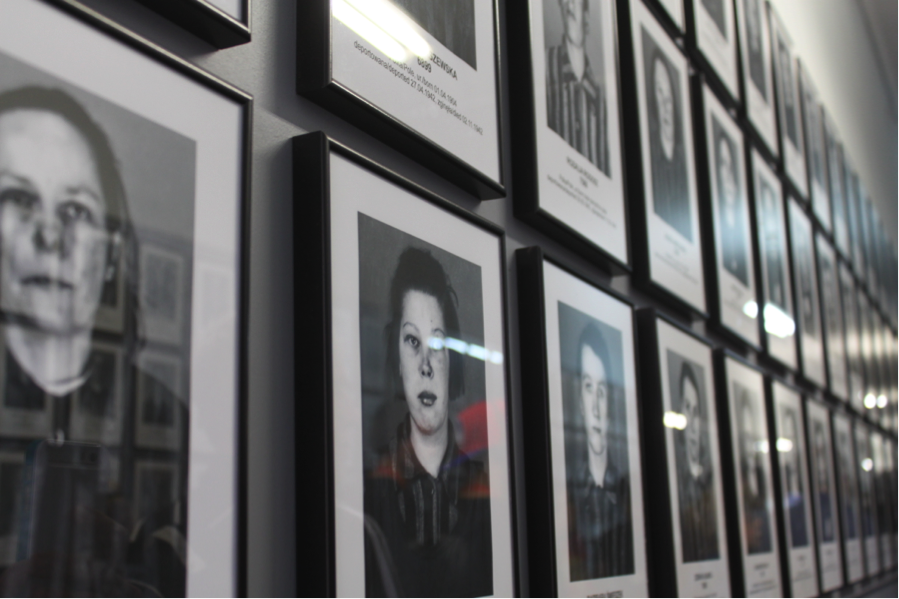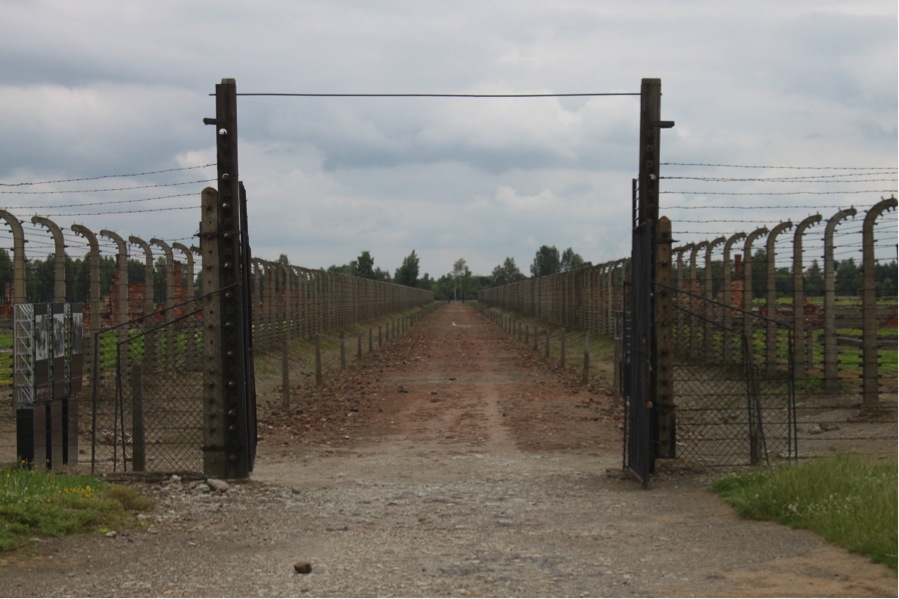Nellie Binder ’15 (CLAS) recently completed an individualized major in International Relations and will start law school in Fall 2015 to pursue her interests in immigration, asylum, and refugee law. In this essay and memoir, she shares her undergraduate research on Holocaust memorialization in the U.S. and in Poland.
The research for my 2014 SURF project, titled “Implications in the Past and Present: Holocaust Memorialization through Photographs, Camps, and Museums,” took place mainly in Poland and Washington D.C. While in the capitol, I spent multiple days in the US Holocaust Memorial Museum, which gave me the chance to examine each exhibition with particular care, keeping in mind how the museum functions within the realm of Holocaust memorialization. I was able to contrast this research with my experience at the actual sites of destruction: the concentration camps themselves. After going to Auschwitz, where I saw groups of Israeli protesters as well as masses of IDF soldiers in uniform, I also began considering the connection between Holocaust memorialization and the ongoing Israeli-Palestinian conflict. How do differing opinions about the Holocaust translate into dialogue regarding the conflict? This observation was critical as it enabled me to connect my research on the past with one of the most highly debated international conflicts in the present.

By visiting various concentration camps throughout Poland, in particular Auschwitz, I was also able to develop a very personal perspective on the formation of Holocaust memory in varying political spheres. This personal response to my time in Auschwitz prompted the short creative memoir piece below.

071514: A Memoir
The headphones excreted static as I attempted to maneuver a button on my radio to the correct station. The number on the screen quivered, slowly switching to 5, which initiated the flow of the tour guides’ voice through my ear. The guide began meaninglessly listing facts, numbers and figures that had been ingrained in my mind since I could comprehend the meaning of being Jewish. I pulled the headphones out, and tossed the radio into my bag. I already knew of the evil men that reigned within the camp, of the millions of prisoners whose forlorn whispers I could hear from miles away, of the hellish events that took place here. I craved to turn this knowledge into sensation, into emotion, however miserable it may be.
Auschwitz sprawled before us. Above me, Arbeit Macht Frei dangled perilously on rusty iron rods. Work makes you free. Beyond the gate, thousands of tourists sauntered within its barbed wire walls, filling the camp to the brim. I had arrived here on a bus that was heaving with dozens of eager travelers, hungry to check Auschwitz off their list of Poland tourist destinations.
As we crossed onto the haunted terrain of the camp, I was bewildered by the juxtaposition of the saturnine brick buildings and the grass below, which was speckled with bright wildflowers that had sprouted from the ashes of the dead. Millions of dandelions, dog violets, and yarrow enveloped the ground, even peeking through creases in concrete and metal. This glorious maze of greenery coated the sullen earth where evil was cultivated just 70 years ago.
Below me, butterflies lightly caressed the flowers. I imagined them as spirits of the deceased, souls of the genocide that could never escape this place for fear that they will leave their dignity or memory behind. I became mesmerized by the irony. There was so much beauty in these delicate creatures, seemingly free to fly away, and yet their quivering wings revealed a story of mortality that the living could never truly understand; a story that chained them to this place of sin.
Thereupon, reality became murky, an eerie existence where the ghosts of the past haunted my present. The tourists evaporated, and I became a prisoner of memory, of a consciousness that I could no longer control. As I drifted through a gas chamber, through endless barracks, I sensed these lost souls smothering me. I became engulfed in their panic, but I let them guide me. Scenes of death came to life behind my eyelids. I tried to breath deeply but even the air carried within it years of suffocation.
I wished that I could share with these souls that their suffering has not been forgotten. Through photographs and letters, jewelry and clothing, oral testimonies and personal memories, remnants of humanity in fact remained undying, immortal. The physical bodies of these wandering souls may have long been abused and discarded, but their spirits live on, within the walls of this place but beyond them as well. Their memory carries on; during Yom Kippur, in the stones of the battered European ghettos, through grandmothers whispering tales of survival by candlelight to their children’s children. The souls that engulfed me in Auschwitz, like the thousands of butterflies, did not know that they can fly free; they do not have to haunt the barracks that are still stained with their blood. They do not have to worry about leaving anything behind, for their suffering will never be forgotten. They are now rooted, eternally, within me.